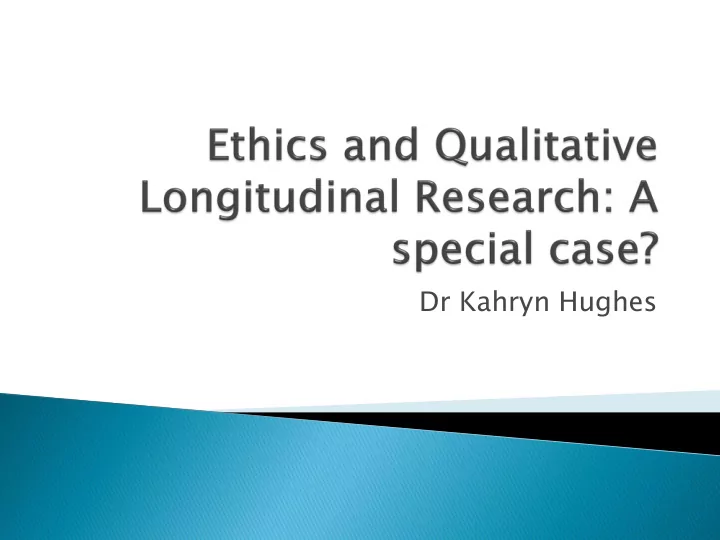

Dr Kahryn Hughes
Consider whether there are any particular ethical issues that emerge through the use of QL methods Look at some strategies deployed in order to address these ethical issues, using Timescapes as an example of such working Some concluding reflections on ethical questions that inevitably require ongoing engagement
Ethical complexities and challenges that are 1. generally prevalent in qualitative research are magnified in complex longitudinal research These complexities and challenges require that 2. ethical reasoning and practice are temporally situated Neale, Henwood and Holland (In press). In s pecial issue of Qualitative Research due spring 2012
Major concerns are around consent, confidentiality, anonymity, the potential impact of the research on both researched and researchers, intrusion, dependency, distortion of life experience through repeated intervention, emotional involvement and problems of closure. (Holland, et al, 2006)
Consent: Consent cannot be ‘once and for all’ if we are repeatedly returning to the research field Can people be asked to consent to things that not even the researchers know may emerge?
Confidentiality? Studies that collect data on the same individuals over time are likely to accumulate a unique data set that acts as ‘fingerprint’ identifying that individual. ◦ How might we protect the identities of research participants over time in the ways we report our findings? ◦ What are the possibilities for anonymity if our methods are explicitly aiming at developing such a rich and informative ‘fingerprint’?
QL: data reuse and archiving maintaining confidentiality in relation to the archiving of data or data sharing: How to protect the participants’ privacy; and the confidentiality of their contribution to the research? Concerns for researchers about themselves: losing control of what happens to data, and original contracts made with participants around confidentiality.
Impact of the research: ◦ How can we manage the ‘research burden’ on participants when the method requires repeated visits and their ongoing commitment to the study? ◦ How can we protect against our research becoming intrusive? How might we understand the impact of repeated research involvement as shaping and even distorting the lives of our participants? ◦ How can we manage the impact of our research in their understandings of their lives? ◦ If we have become part of their lives, how can we manage our withdrawal from the field?
Ethical practices cannot be fully determined beforehand for they are context specific and require an ongoing and sensitive appraisal of local circumstances and sensibilities. a shift from an accountability model to a process sensitive support model of pursuing ethical practice situated and processual ethics rather than contractual ethics
Informed consent in the context of QL is not a one-off event, but a process, with continuous consultation necessary throughout all phases of the research, including data analysis and final reporting (France, Bendelow and Williams 2000).
Intrusion, dependency and distortion of real life processes Solutions in Timescapes: ◦ partnership approach where data and interpretation are negotiated in how they are collected, so that they involve less interventionist approaches where participants had little contact with the researchers other than at data collection points
Some strategies used within Timescapes Awareness but not hyper-vigilance about such risks; assisted by regular "round table" discussions Collaborative development of data pooling, management & archiving; through which the conditions for sharing & accessing data have been negotiated within and between the different research teams (e.g., how confidentiality of participants is protected in publications) Archiving as part of a live study; different levels of access and control to protect sensitive data & facilitate secondary analysis
Making data anonymous; participants’ preferences; balancing with contextualisation; when to begin and what to make anonymous? How data are re-presented in the future? Silencing of marginalised groups? Ensuring transfer of knowledge between researchers of sensitive information (e.g. still birth/death of child) In writing up, researchers communicate respectfulness towards their participants, and ‘tread carefully’ in order to avoid reinstating oversimplified evaluative logics
The research relationship inevitably becomes a focus of analytic attention within QL because that is where negotiation, understanding and shaping of research context occurs (Thomson and Holland 2003)
Research relationships are constitutive of particular sorts of experience in the research encounter and also, through the strategies whereby data are generated, of the sorts of meanings that emerge in the research process ◦ How do the relationships formed in the research encounter produce particular meanings and representations of participants’ lives? ◦ What is the impact of the ethical practices informing the shaping of these relationship on the research?
Situated and negotiated ethics that emerge through the research process must be considered in these ways: ◦ as shaped through, and shaping, particular research relationships; ◦ as shaping the possibilities for the generation of particular sorts of data, and content within data We shape our ideas within our research teams, with those around us (academics, gatekeepers) and our participants: the research process itself is one of negotiation and ongoing production
The process of developing relationships, and entering relational networks inevitably requires negotiation, time, engages us in particular spatial, embodied practices. Such practices can be considered dynamic methods productive of research, research relationships, and research findings, dissemination (other relational networks). These practices are necessarily predicated on ethical stances and ethical practices
Ethics often seen as constraining; better to ask the question: Which ethics are possible? With whom, and why? Ethical practices as negotiated and produced through the research must be seen as empirical data in and of themselves which sorts of relationships are possible? Why these and not others? What does this tell us about our research field/research process/ research participants?
Temporal ethics are deserving of further attention in research generally, but particularly in QL; our approach in Timescapes reflects a shift from an accountability model to a process sensitive support model of pursuing ethical practice an approach that deals with ethical dilemmas through ‘careful judgement based on practical knowledge and attention to detail in context of time and place’ (Edwards and Mauthner, 2002:27).
Recommend
More recommend